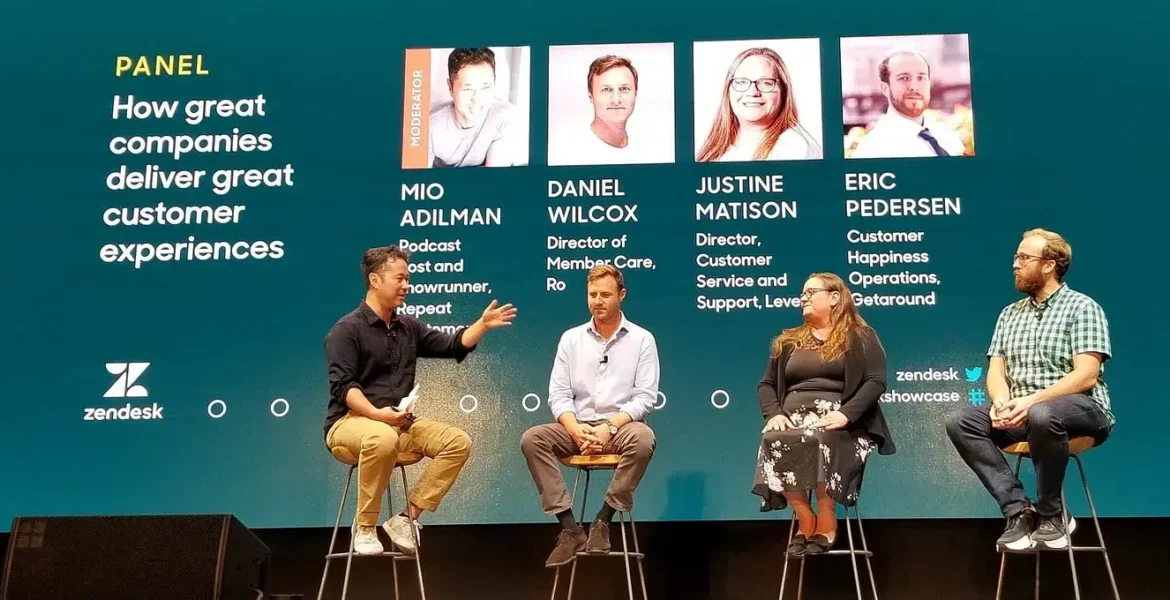How I Became an Accidental Expert by Hosting a Podcast

I’m standing backstage at San Francisco’s Masonic Theatre. Nervous as hell, I’m about to be called on stage at a tech conference in front of several hundred Silicon Valley insiders. Nervous because I know the MC will introduce me as a “customer experience expert.” But until hosting a “CX” podcast just one year ago, I had never even heard the term “customer experience.”
My sudden attack of “imposter syndrome” happened a few months ago at Zendesk Showcase. Zendesk is a customer service and engagement software platform. The company had invited CX executives to check out its new products. And invited me to lead an on-stage panel because I host Zendesk’s podcast called Repeat Customer. In every episode of Repeat Customer, we profile a company known for exemplary “customer experience”.
When Pacific Content started developing a business podcast for Zendesk, we were inspired by the colorful production and storytelling employed by Masters of Scale. No one in the CX podcast category was doing anything as entertaining. This was a good opportunity for Zendesk.
What we knew we wouldn’t have, though, was an expert host like Masters of Scale’s Reid Hoffman, founder of LinkedIn. Who we had was me. Me who had no business background. No billion dollar valuation. No expertise. Good times.
But this turned out to be its own opportunity.
Customer experience is a quickly growing but relatively nascent business strategy. A recent study found that over 80% of surveyed CEOs viewed CX as integral to success while only 20% thought their companies executed it properly.
In other words, we discovered that overall public awareness of CX was low. Basically, potential listeners wanted to learn more, and might not be coming to us overly informed. So, in some ways, NOT HAVING a subject matter expert speaking to them from on high could be a benefit. Furthermore, If you wanted a drier CX-expert-interviews-other-CX-expert podcast, those already existed. What we wanted to do was elevate and illustrate CX through compelling storytelling.
It also helped that all of us, everyone, are customers, and a big part of customer experience is listening to customers. So the audience might feel less intimidated if they embarked on a journey of learning through my own lens. Two seasons, fifteen episodes, and one Webby Award nomination later, I think that’s happened.
So back to that Zendesk Showcase, and me quaking in my boots backstage. I’m announced as a “customer experience expert.” I bound on stage (my memory is that I bounded on-stage, okay?)… and I start to ask the panelists expert-sounding questions.
What follows is a dynamic discussion about how three totally different companies approach best-in-class CX.
I look out at the audience. They are fully engaged in the conversation, eager to learn. I start to relax.
Tips
- Know your potential audience’s POV, degree of understanding. What host, format structure would best serve them?
- If you aren’t going with an expert host, don’t freak out. And don’t pretend you’re an expert if you aren’t. Make your non-expertise part of the story.
- Do a bunch of research — terminology, history, current trends — so you can better understand interviewees and write compelling questions.
- Identify down-to-earth subject matter experts beyond the main interview who can help contextualize and explain stuff in plain language. Zendesk was really helpful with that.
- Have fun. You’re gonna learn new stuff.
Sign up for the Pacific Content Newsletter: audio strategy, analysis, and insight in your inbox. Once a week.
